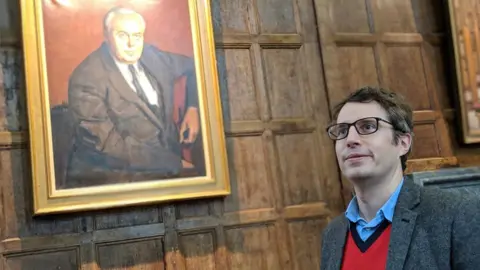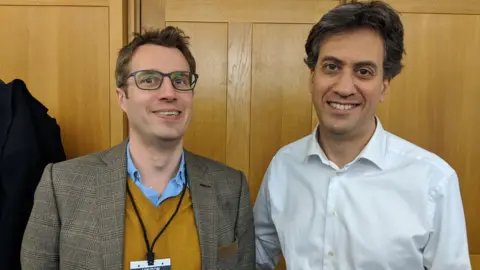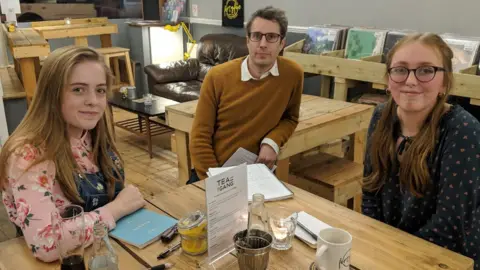Should the UK be raising rather than lowering the voting age?
 BBC
BBCIt is 50 years since Harold Wilson's government lowered the voting age from 21 to 18.
Many now want the age at which people can vote to go even lower.
David Runciman, a professor of politics at Cambridge, recently called for it to be set at six, and while that is not a widely shared view, many politicians are actively campaigning to allow 16 and 17-year-olds to vote at general elections.
For example, in 2013, the then leader of the Labour party, Ed Miliband, committed Labour to votes at 16. The reasons he gives for this are commonly heard from advocates of lowering the voting age:
"The future of our society is going to affect young people the most," he said. "When you get to the age of 16 you can join the Army, you can get married, you can pay taxes. I think you should be able to decide the country's future."
What can you do at 16?

Yet there are some good reasons to be a little sceptical of these arguments.
As Phil Cowley, a professor of politics at Queen Mary, University of London, notes, in reality these three options apply to very few sixteen and seventeen-year-olds. They are also not as clear-cut as proponents of votes at 16 often make out:
"When you dig a bit deeper you discover that most of these things are really 18," he says.
"You can join the armed forces at 16, but only with parental permission and you're not supposed to serve on the front line until you are 18. In England and Wales, you can only get married below the age of 18 with parental permission."
As Prof Cowley also points out, the age at which we are allowed to do lots of other things has not been going down, but up.
If you want to use a tanning booth, buy cigarettes or fireworks, or get a tattoo you now need to be 18. It seems odd to suggest that people are responsible enough to vote at 16, but not buy sparklers.
Indeed, overall, society appears to think that people are growing up more slowly than they were in 1969.
Growing up later
And it is true that people are reaching life's milestones later and later, especially when it comes to the world of work.
"Only 29% of 16 to 19-year-olds are working full-time now," says Lucinda Platt, a professor of social policy at the London School of Economics.
"That contrasts with the late 1960s when you would expect around four-fifths of that age group to be in work."
Clearly, it is unreasonable to say that because someone is not working they should not have the vote. But the average age at which we assume adult responsibilities is presumably part of the story when we set the voting age. In fact, it might even go further than that.
Prof Abigail Baird, a psychologist and neuroscientist at Vassar College in New York, argues that important experiences, like starting work, are a crucial part of adolescent brain development.

"In early adulthood our brain is poised to learn how to make decisions and poised to learn how to be an adult," she says.
"But since what's expected of adults in different cultures varies so much, we need the experience of that culture to tell us what we need to do."
As MRI brain scanning is a relatively recent technology it is difficult to be sure, but it seems very likely that if important experiences come later in life then so does brain development:
"Forced to speculate, I would say an 18-year-old brain 50 years ago probably looked more like a 23-year-old brain does now," Prof Baird says. "Most 25 or 26-year-olds would be identical, but I think the way in which you get there is different now."
Voting later?
At the 1970 election when 18-year-olds entered the polling booth for the first time, they were voting after having assumed lots of legal rights and responsibilities and were also very likely to be in work.
Neither of these things is true today. Perhaps rather than talking about lowering the voting age, should we consider raising it back to 21?
To my mind, the arguments in favour of doing so seem no weaker, and in many ways much stronger, than the arguments in favour of votes at 16.
Of course, that does not mean that I relish the prospect of a conversation with my own students about their potential disenfranchisement.
Fortunately for me, principles have very little to do with the voting age. In reality, the franchise, whether in 1969 or today, is largely decided by political machinations.
As Prof Cowley argues: "Almost all the discussions about the franchise involving politicians involve political calculation. That was true of the Wilson government; it was true of extensions to the franchise in the 19th and early 20th Century. Wilson, and the people around him, thought that it would work to Labour's advantage."
Of course, these calculations do not always prove to be correct.
It is not clear that Labour did benefit from lowering the voting age in 1969, just as it is not clear that the SNP greatly benefited from lowering the voting age to 16 for the Scottish independence referendum in 2014.
But those decisions were based on political calculation, not principle. It should be no surprise that parties on the left, which generally do well among young people, favour a lower voting age and parties on the right, which generally do badly among young people, do not.
No going back
The second realpolitik factor that divorces the voting age from principle is what policymakers sometimes call the "bleeding stump problem".
In essence, when people can show that something has been removed from them, they get upset. The absence of something you have never had is a tougher thing to get angry about.
Taking away the vote from 18 to 20-year-olds would probably benefit the Conservatives and UKIP a little, but it would also mean a small number of highly vocal, angry people. From those political parties' point of view, it is not worth it.
This means that whether it is the right thing to do or not, votes at 21 is not going to happen for the simple reason that while it is easy to give people stuff, it is tricky to take stuff away.
Politicians have no problem reducing taxes, but find it much more difficult to increase them. The same is true of the franchise.
It's easy to give people rights and difficult to remove them. That means if votes at 16, or indeed six, does eventually happen, it will be almost impossible to reverse. This is, therefore, a decision that we should not take lightly. Because once such a change happens, there will be no going back.
- James Tilley is a professor of politics at the University of Oxford and a Fellow of Jesus College, Oxford. Let's Raise the Voting Age! on BBC Radio 4 at 20:00 GMT on Monday, 7 January.
